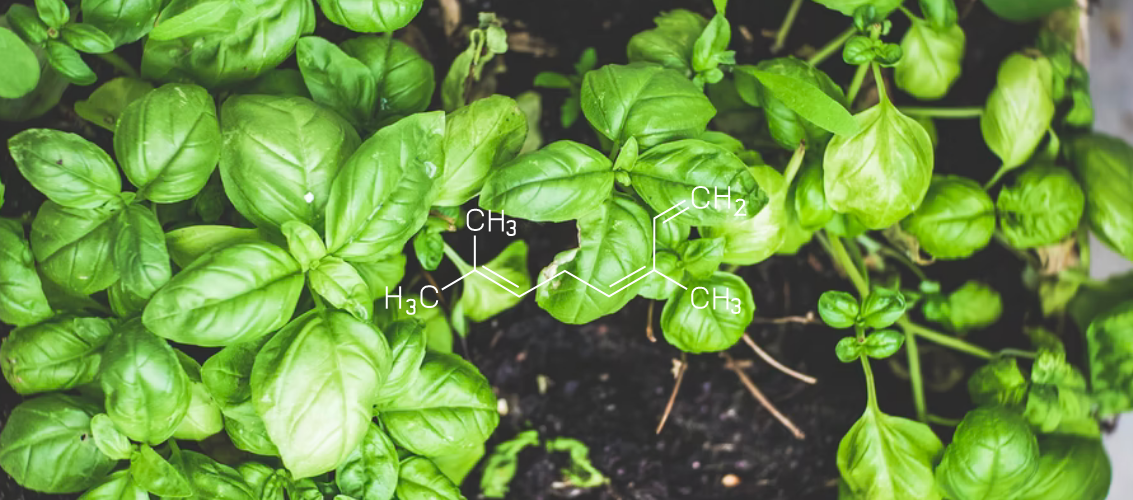
Benefits of Basil Super-Plant
What is Basil?
Basil (Ocimum basilicum), also referred to as “great basil”, is a tender culinary herb that belongs to the Lamiaceae family known as mints. Basil originates from the tropical regions of Central Africa to Southeast Asia. Basil has many varieties and species; some types include sweet basil used as a flavor, lemon basil, holy basil, and Thai basil. The most common varieties are either annual or perennial. Basil produces small and white flowers that grow from a central inflorescence located at the apex of the plant's main stem.
Traditional Uses of Basil
Basil is prepared in the form of tea and is used in traditional medicine to treat depression, constipation, stomach cramps, anxiety, and flatulence.
Uses of Basil
1. Basil is used as a cooking recipe in cooking dishes.
2. Basil is used as a flavoring agent in beverages.
3. Basil leaves can be blended into soups, sauces, salad, etc., and can be consumed.
4. Basil is also served as an appetizer.
5. Basil is used as an insect repellent against mosquitoes.
Surprising facts about Basil
Depending on the variety, basil is either an annual or a perennial plant that grows 12 to 51 inches in height.
Basil produces oval-shaped green and silky leaves that are arranged oppositely on the stem. Some other basil varieties have purple leaves.
Basil produces small flowers that are always on top of the plant stem. The flowers can be white, pink or mauve.
After insects have pollinated the flowers, they become dry fruits known as achene.
Basil propagation can be done through its plant cuttings or its seeds.
Although both the flowers and leaves are edible, the leaves are the most used part of the plant. The leaves contain many essential oils, which produces the flavor that basil has.
Every basil species has its distinct aroma. Cinnamon basil has a sweet cinnamon-like scent, while lemon basil has a lemon scent and taste.
Basil contains high nutritional values and minerals such as vitamins A, B6, C, and K, iron, magnesium, and manganese.
Basil can be used in both dry or fresh form. Basil is used in preparing dishes made of salads, pesto, tomato, chicken meat, etc.
Basil leaves are used as an ingredient for preparing ice creams and chocolates in some places in the world.
Basil is used traditionally to treat depression, flatulence, stomach cramps, anxiety and constipation.
Health benefits of Basil and why myAir bars contain it
Basil has several health benefits, some of which are considered below:
1. Basil can provide support for liver health
In 2005, a study in rats confirmed that a powdered preparation of holy basil or tulsi contained antioxidants that positively affected liver health. The scientists applied the powder preparation after inducing an injury on the liver with a toxin.
Basil contains antioxidants that can provide support for liver health.
2. Basil can help to reduce oxidative stress
The presence of antioxidants in basil enables it to eliminate free radicals from the body; free radicals are unstable molecules that form in the body due to smoking, metabolism, dietary choices, and other natural processes.
According to some scientists, when free radicals form in the body, they cause oxidative stress, leading to cell damage and diseases such as diabetes, heart disease, arthritis, rheumatoid, etc. However, consuming basil can provide the body with antioxidants that can fight against antioxidants.
Basil produces antioxidants that can fight against free radicals, thereby reducing oxidative stress in the body.
3. Basil can help to lower blood sugar levels
Some traditional medicine practitioners recommend basil as a remedy to help manage blood sugar levels in the body.
In 2019, a study in rats showed that sweet basil leaves extract aided reduction in high blood sugar levels. Furthermore, basil leaves may also help in treating the long-term effects of high blood sugar levels. However, more research on basil is still needed.
According to a study in rats in 2019, basil can help to lower blood sugar levels and its effects.
4. Basil can protect the skin against aging
In 2011, research was published on the effects of sweet basil on the skin. The scientists applied a basil extract to the skin of the models in the laboratory. The results obtained suggested that using basil extracts as an ingredient in topical skin creams might help to improve skin hydration, thereby reducing skin wrinkling and roughness. Consuming basil may not produce this effect, however, basil contains antioxidants which may cause positive and protective effects on its consumers.
Basil extracts can help to protect the skin from aging.
5. Basil can help enhance mental health
Mental stress can cause free radicals to be produced in the body.
In 2014, there was a review of the role of tulsi in Ayurvedic medicine; tulsi contains properties that can help reduce depression, anxiety, stress, increase the thinking and reasoning ability, improve sleep and prevent memory loss due to aging.
Basil can help to improve mental health by reducing depression, anxiety, and stress.
6. Basil can provide support for cardiovascular health
In 2011, a review of sweet basil extract findings reported that sweet basil contains eugenol, which was responsible for the temporary reduction in high blood pressure in the model; 2 minutes later, the blood pressure returned to its high level. Eugenol can lower high blood pressure by blocking calcium channels in the body.
Another study of 24 healthy people took either a capsule containing 300 mg of a dried tulsi leaf extract or a placebo once daily for 4 weeks. After four weeks, those who consumed tulsi extract had reduced cholesterol and triglycerides than those who did not. Therefore, the researchers concluded that basil extract could help lower the risk factors of having cardiovascular diseases.
Basil can provide support for cardiovascular health, thereby reducing the risk of having cardiovascular diseases.
7. Basil can help to reduce inflammation
Oxidative stress in the body can cause inflammation. In 2017, some researchers analyzed the anti-inflammatory effects of two sweet basil essential oil preparations on the body. Results obtained show that basil oil extract may help treat many inflammation-related diseases resulting from oxidative stress.
Basil possesses anti-inflammatory properties which prevent inflammation and diseases related to it.
8. Basil can help to fight against infections
Many traditional medicine practitioners have used basil as an antimicrobial agent, which is also supported by some scientific research.
In 2013, some researchers applied sweet basil oil extract to various strains of bacteria called Escherichia coli. The bacteria were from hospital equipment, people with skin, urinary, abdominal, and respiratory infections. The results obtained showed that basil oil extract fought against the bacteria. The researchers concluded that some basil oil extract preparations could aid in treating or preventing some types of infection.
Basil oil extract can help fight against bacteria in the body.
Conclusion
Basil is a culinary herb that can be consumed as tea. Basil possesses many healing properties, for which it is used to treat many ailments such as depression, diabetes, hypertension etc. myAir bars are packed with basil.
Footnotes
Antioxidant Activity of The Ancient Herb, Holy Basil in CCl4-Induced Liver Injury in Rats
Yuvaraj Ponnusam, Therasilin Louis, [...], and Shanmugamurthy Lakshmanan
https://www.ncbi.nlm.nih.gov/pmc/articles/PMC4766851/
Formulation and in vivo evaluation for anti-aging effects of an emulsion containing basil extract using non-invasive biophysical techniques
A. Rasul and N. Akhtar
https://www.ncbi.nlm.nih.gov/pmc/articles/PMC3304398/
Glucose Lowering Effect of Basil Leaves in Diabetic Rats
Sry Suryani Widjaja, Rusdiana, and Maya Savira
https://www.ncbi.nlm.nih.gov/pmc/articles/PMC6542390/
Role of natural herbs in the treatment of hypertension
Nahida Tabassum and Feroz Ahmad
https://www.ncbi.nlm.nih.gov/pmc/articles/PMC3210006/
Tulsi - Ocimum sanctum: A herb for all reasons
Marc Maurice Cohen
https://www.ncbi.nlm.nih.gov/pmc/articles/PMC4296439/
Evaluation of the chemical composition, antioxidant and anti-inflammatory activities of distillate and residue fractions of sweet basil essential oil
Hailong Li, Yanhui Ge, [...], and Qiang Fu
https://www.ncbi.nlm.nih.gov/pmc/articles/PMC5495712/
The Potential of Use Basil and Rosemary Essential Oils as Effective Antibacterial Agents
Monika Sienkiewicz, Monika Łysakowska, [...], and Edward Kowalczyk
https://www.ncbi.nlm.nih.gov/pmc/articles/PMC6270641/
How can antioxidants benefit our health?
Medically reviewed by Natalie Olsen, R.D., L.D., ACSM EP-C — Written by Megan Ware, RDN, L.D. on May 29, 2018
